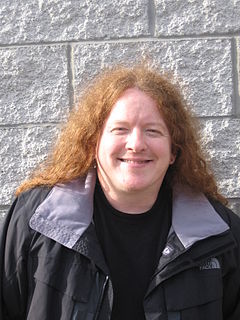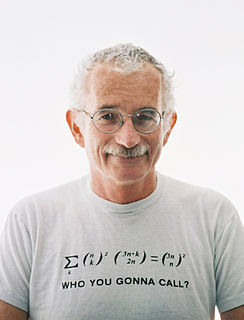A Quote by Shonda Rhimes
The idea that the more you hide something, the more it becomes something that's supposed to feel shameful is very true.
Related Quotes
You can keep counting forever. The answer is infinity. But, quite frankly, I don't think I ever liked it. I always found something repulsive about it. I prefer finite mathematics much more than infinite mathematics. I think that it is much more natural, much more appealing and the theory is much more beautiful. It is very concrete. It is something that you can touch and something you can feel and something to relate to. Infinity mathematics, to me, is something that is meaningless, because it is abstract nonsense.
What I mean is that if you really want to understand something, the best way is to try and explain it to someone else. That forces you to sort it out in your mind. And the more slow and dim-witted your pupil, the more you have to break things down into more and more simple ideas. And that's really the essence of programming. By the time you've sorted out a complicated idea into little steps that even a stupid machine can deal with, you've learned something about it yourself... The teacher usually learns more than the pupils. Isn't that true?
I am a writer who is definitely working with a specific language and more than English, that language is American. And I work very much in idiom and am very interested in the play of different kinds of rhetoric, whether it is the more high-flown stuff that reeks of age. I love to juxtapose something like that with something more current or urgent. I am always interested not in America by itself, but America as an idea and how that idea has changed over time, in the eyes of the rest of the world and in the eyes of Americans.
This is, if not a lifetime process, it's awfully close to it. The writer broadens, becomes deeper, becomes more observant, becomes more tempered, becomes much wiser over a period time passing. It is not something that is injected into him by a needle. It is not something that comes on a wave of flashing, explosive light one night and say, 'Huzzah! Eureka! I've got it!' and then proceeds to write the great American novel in eleven days. It doesn't work that way. It's a long, tedious, tough, frustrating process, but never, ever be put aside by the fact that it's hard.
In the creative industries, there are few things more exciting than a zinger - a thought, idea, line, plot device - anything really, that just totally works in a fundamentally new and fresh way. It's like a uniquely lovely melody or a new taste idea in cooking. Something special, something new, something wonderful. They're also very rare.
The more we as a society make women's sex lives seem like a secret, the more hostile that becomes. Because when you get into that cycle of thinking, no matter what you're doing, you feel shameful about it, because there's no way to talk about it. I think that through talking about it and sharing stories you realize the things you may have felt shameful about are totally normal and totally OK. Everyone's normal in their own way. You can only come to that realization if you're having these conversations, and learning what normal is for other people.
Sam was starting to feel anxious. Nutella and noodles were fine. Great in fact. Miraculous. But he'd been hoping for more food more water more medicine something. It was absurdly like Christmas morning when he was little: hoping for something he couldn't even put a name to. A game changer. Something...amazing.
I feel like something has changed for me, but it’s a new change, so it’s going to be hard for me to describe. Maybe it has something to do with turning 30. I don’t feel as shy or nervous or self-conscious. I have more confidence that I can handle what life brings me. I don’t feel scared to have an idea and express it. I feel giddy about it because it’s a complete transformation. It’s like I’ve found my voice.
Sometimes it's not like I write very specific, it's more like I add an atmosphere almost to something that might have been quite awkward in my mind from the beginning. Something has happened and I want to force myself to think of it in a more positive way. And then I force myself to write something that convinces me that this is actually something pretty good or something that I learned something valuable from.


































